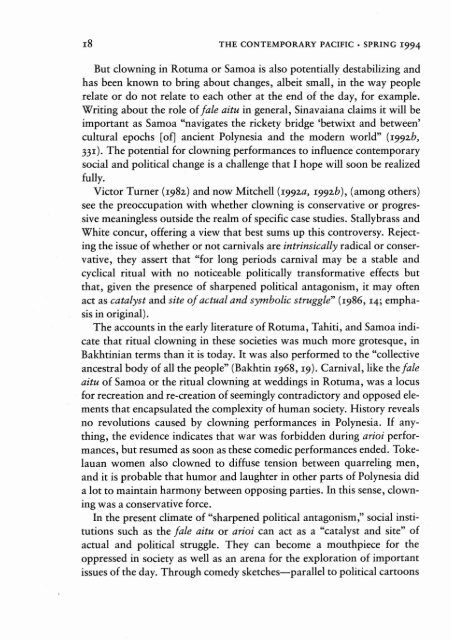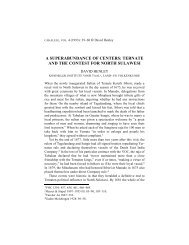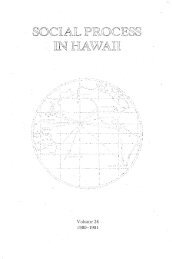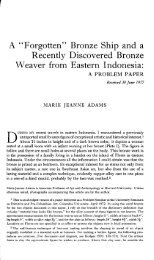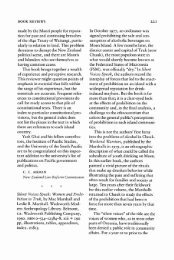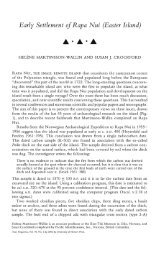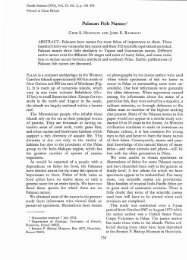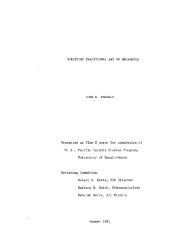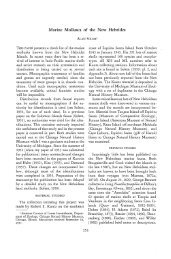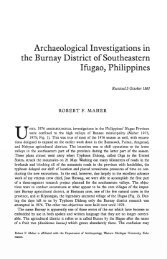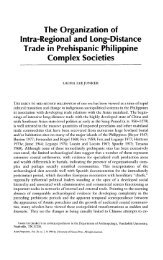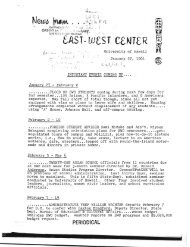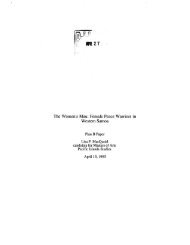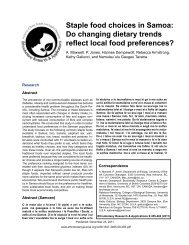Clowning as Political Commentary: Polynesia, Then ... - ScholarSpace
Clowning as Political Commentary: Polynesia, Then ... - ScholarSpace
Clowning as Political Commentary: Polynesia, Then ... - ScholarSpace
Create successful ePaper yourself
Turn your PDF publications into a flip-book with our unique Google optimized e-Paper software.
18 THE CONTEMPORARY PACIFIC· SPRING 1994<br />
But clowning in Rotuma or Samoa is also potentially destabilizing and<br />
h<strong>as</strong> been known to bring about changes, albeit small, in the way people<br />
relate or do not relate to each other at the end of the day, for example.<br />
Writing about the role offale aitu in general, Sinavaiana claims it will be<br />
important <strong>as</strong> Samoa "navigates the rickety bridge 'betwixt and between'<br />
cultural epochs [of] ancient <strong>Polynesia</strong> and the modern world" (I992b,<br />
331). The potential for clowning performances to influence contemporary<br />
social and political change is a challenge that I hope will soon be realized<br />
fully.<br />
Victor Turner (1982) and now Mitchell (I992a, I992b), (among others)<br />
see the preoccupation with whether clowning is conservative or progressive<br />
meaningless outside the realm of specific c<strong>as</strong>e studies. Stallybr<strong>as</strong>s and<br />
White concur, offering a view that best sums up this controversy. Rejecting<br />
the issue of whether or not carnivals are intrinsically radical or conservative,<br />
they <strong>as</strong>sert that "for long periods carnival may be a stable and<br />
cyclical ritual with no noticeable politically transformative effects but<br />
that, given the presence of sharpened political antagonism, it may often<br />
act <strong>as</strong> catalyst and site ofactual and symbolic struggle" (1986,14; emph<strong>as</strong>is<br />
in original).<br />
The accounts in the early literature of Rotuma, Tahiti, and Samoa indicate<br />
that ritual clowning in these societies w<strong>as</strong> much more grotesque, in<br />
Bakhtinian terms than it is today. It w<strong>as</strong> also performed to the "collective<br />
ancestral body of all the people" (Bakhtin 1968,19). Carnival, like the fa Ie<br />
aitu of Samoa or the ritual clowning at weddings in Rotuma, w<strong>as</strong> a locus<br />
for recreation and re-creation of seemingly contradictory and opposed elements<br />
that encapsulated the complexity of human society. History reveals<br />
no revolutions caused by clowning performances in <strong>Polynesia</strong>. If anything,<br />
the evidence indicates that war w<strong>as</strong> forbidden during arioi performances,<br />
but resumed <strong>as</strong> soon <strong>as</strong> these comedic performances ended. Tokelauan<br />
women also clowned to diffuse tension between quarreling men,<br />
and it is probable that humor and laughter in other parts of <strong>Polynesia</strong> did<br />
a lot to maintain harmony between opposing parties. In this sense, clowning<br />
w<strong>as</strong> a conservative force.<br />
In the present climate of "sharpened political antagonism," social institutions<br />
such <strong>as</strong> the fale aitu or arioi can act <strong>as</strong> a "catalyst and site" of<br />
actual and political struggle. They can become a mouthpiece for the<br />
oppressed in society <strong>as</strong> well <strong>as</strong> an arena for the exploration of important<br />
issues of the day. Through comedy sketches-parallel to political cartoons


